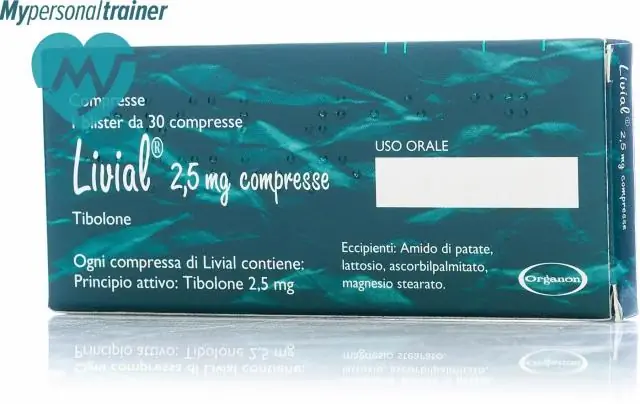- Author Rachel Wainwright wainwright@abchealthonline.com.
- Public 2023-12-15 07:39.
- Last modified 2025-11-02 20:14.
Livial
Livial: instructions for use and reviews
- 1. Release form and composition
- 2. Pharmacological properties
- 3. Indications for use
- 4. Contraindications
- 5. Method of application and dosage
- 6. Side effects
- 7. Overdose
- 8. Special instructions
- 9. Application during pregnancy and lactation
- 10. In case of impaired renal function
- 11. For violations of liver function
- 12. Drug interactions
- 13. Analogs
- 14. Terms and conditions of storage
- 15. Terms of dispensing from pharmacies
- 16. Reviews
- 17. Price in pharmacies
Latin name: Livial
ATX code: G03CX01
Active ingredient: tibolone (tibolone)
Manufacturer: Organon, N. V. (Organon, NV) (Netherlands)
Description and photo update: 2019-20-08
Prices in pharmacies: from 2485 rubles.
Buy

Livial is an anti-climacteric agent.
Release form and composition
Dosage form - tablets: round flat shape with beveled edges, almost white or white, engraved on both sides: on one - the number "2" under the code "MK", on the other - a five-pointed star with the inscription "ORGANON" (28 pcs. in blisters, and in a cardboard box 1 or 3 blisters).
The active ingredient of Liviala is tibolone, in 1 tablet - 2.5 mg.
Auxiliary components: potato starch, lactose, ascorbyl palmitate, purified water (removed during the production process), magnesium stearate.
Pharmacological properties
Pharmacodynamics
When taken orally, the active substance of Liviala - tibolone, is metabolized at a high rate, forming three compounds that determine the pharmacodynamic characteristics of this drug. For two metabolites of tibolone - 3α-hydroxytibolone and 3β-hydroxytybolone - estrogen-like activity is characteristic, while the third metabolite - the Δ4-isomer of the active component Livial - has androgen-like and gestagen-like activity.
Livial eliminates estrogen deficiency in postmenopausal women and relieves symptoms caused by a lack of these hormones in the body (decreased libido, hot flashes, dryness and discomfort in the vagina, night sweats, irritability, depression, changing mood, etc.). Livial also prevents bone loss after removal of the ovaries or the onset of menopause.
Pharmacokinetics
After oral administration, the absorption of tibolone is rapid and intense. Since the substance is rapidly metabolized, its plasma content is extremely low. The concentration of the Δ4 isomer in blood plasma is also low, therefore, a number of pharmacokinetic parameters cannot be determined. The maximum plasma concentrations of tibolone metabolites - 3α-hydroxytibolone and 3β-hydroxytybolone - are slightly higher, but there is no cumulation effect.
As a result of the studies, the following pharmacokinetic parameters of tibolone and its metabolites were determined after oral administration of 2.5 mg of Livial:
- tibolone: with a single dose, the maximum concentration is reached in 1.08 hours and is 1.37 ng / ml; with multiple - the maximum concentration is reached in 1.19 hours and is 1.72 ng / ml;
- 3α-hydroxytibolone: with a single dose, the maximum concentration is reached in 1.21 hours and is 14.23 ng / ml, the half-life is 5.78 hours, the area under the pharmacokinetic curve AUC is 53.23 ng / ml × h; with repeated administration, the maximum concentration is reached in 1.15 hours and is 14.15 ng / ml, the average equilibrium concentration is 1.88 ng / ml, the half-life is 7.71 hours, the minimum concentration is 0.23 ng / ml, the area under the AUC curve - 44.73 ng / ml × h;
- 3β-hydroxytibolone: with a single dose, the maximum concentration is reached in 1.37 hours and is 3.43 ng / ml, the half-life is 5.87 hours, the area under the pharmacokinetic curve AUC is 16.23 ng / ml × h; with repeated administration, the maximum concentration is reached in 1.35 hours and is 3.75 ng / ml, the area under the AUC curve is 9.2 ng / ml × h;
- Δ4 isomer: with a single dose, the maximum concentration is reached in 1.64 hours and is 0.47 ng / ml; with multiple - the maximum concentration is reached in 1.65 hours and is 0.43 ng / ml.
Tibolone is excreted mainly in the form of conjugated metabolites (most of them are sulfated). Part of the dose taken is excreted in the urine, but the bulk is excreted through the gastrointestinal tract with feces.
Food intake does not have a clinically significant effect on the degree of absorption. Pharmacokinetic parameters of tibolone and its metabolites do not depend on renal function.
Indications for use
According to the instructions, Livial is indicated for postmenopausal women:
- Treating signs of estrogen deficiency;
- Prevention of osteoporosis in patients with a high risk of fractures with intolerance to drugs of other groups designed to prevent osteoporosis.
Contraindications
- Breast cancer, malignant estrogen-dependent tumors, including endometrial cancer (diagnosed, including history or suspected);
- Endometrial hyperplasia in an untreated state;
- Vaginal bleeding of unknown etiology;
- Thrombophilic conditions, including antithrombin, protein C, or protein S deficiency;
- Arterial or venous thrombosis, thromboembolism, including a history (including thrombophlebitis and deep vein thrombosis, myocardial infarction, hemorrhagic or ischemic cerebrovascular disorders, pulmonary embolism);
- Angina pectoris, transient ischemic attacks and other conditions preceding thrombosis (currently or in history);
- Cardiovascular failure in the stage of decompensation;
- Uncontrolled hypertension, atrial fibrillation, subacute bacterial endocarditis and complicated lesions valvular heart disease, severe injury, prolonged immobilization after major surgery, obesity (body mass index greater than 30 kg per m 2), and other numerous or severe risk factors for the emergence of arterial or venous thrombosis;
- Severe liver disease or liver dysfunction;
- Liver neoplasms (including liver adenoma of malignant or benign etiology, including history);
- Liver failure;
- Otosclerosis, which has arisen while taking hormonal contraceptives or during a previous pregnancy in history;
- Porphyria;
- Galactose intolerance, glucose-galactose malabsorption, lactase deficiency;
- The period of pregnancy and breastfeeding;
- The period since the last menstruation is less than 1 year;
- Confirmed hypersensitivity to drug components.
With caution, Livial should be prescribed for bronchial asthma, uterine fibroids (leiomyoma) and / or endometriosis, controlled arterial hypertension, cardiovascular insufficiency without signs of decompensation, cholelithiasis, the presence of risk factors for estrogen-dependent tumors (breast cancer in the mother or sister), renal insufficiency, increased blood cholesterol levels, impaired carbohydrate metabolism, diabetes mellitus (with or without complications), systemic lupus erythematosus, migraine or severe headache, a history of endometrial hyperplasia, epilepsy, otosclerosis not associated with pregnancy or taking hormonal contraceptives.
Careful observation by a physician is necessary if the indicated pathologies occurred in the patient's history or recurred and worsened during the period of Livial's administration.
Instructions for the use of Livial: method and dosage
Do not start using Livial earlier than 12 months after the last menstrual bleeding! If a woman, with or without another hormonal drug, has spotting, then before starting therapy, it is necessary to make sure that there are no malignant neoplasms of the genital organs.
If the previous hormone replacement therapy had a cyclic regimen, Livial is started the day after the completion of the previous treatment regimen. When switching from a continuous hormone replacement therapy combination, therapy can be started at any convenient time.
The tablets are taken orally, swallowed whole and washed down with a little water.
Livial's dosage is 1 tablet per day, which should be taken every day at the same time. The application starts with a tablet in a blister corresponding to the current day of the week and then follows on the days of the week indicated on the package. Reception from a new blister must be started the next day after the end of the tablets in the previous one. You can not allow a skip in taking the next pill or being late in time.
In case of an accidental delay in taking the next tablet less than 12 hours, Livial should be taken immediately. If the delay is more than 12 hours, then you should skip the appointment and take the next tablet from the blister at the set time. Do not take a double dose of the drug.
During the period of treatment, progestogens should not be additionally prescribed.
Side effects
The use of Livial has the following side effects:
- Reproductive system and mammary glands: often - pain in the mammary glands, discharge (including bloody) or bleeding from the vagina, thickening of the endometrium, vulvovaginitis and vulvovaginal candidiasis, genital itching, pain in the pelvic region, dysplasia of the cervix; infrequently - engorgement of the mammary glands, mycosis, soreness of the nipples;
- Gastrointestinal tract: often - pain in the lower abdomen;
- Skin and subcutaneous tissues: often - increased hair growth, including on the face; infrequently - acne;
- Laboratory and instrumental indicators: often - violation of the cytological characteristics of the cervical epithelium, increase in body weight;
- Others: frequency unknown - depression, headache, dizziness, migraine, itchy skin and rashes, seborrheic dermatitis, gastrointestinal disorders (flatulence, diarrhea), visual disturbances (including blurred vision), peripheral edema, fluid retention in the body, joint and muscle pain, functional disorders of the liver, increased activity of liver enzymes.
Therapy with drugs containing only tibolone or estrogen is associated with an increased risk of developing breast cancer in women, but it is much lower than in the case of combined hormonal drugs. The degree of risk depends on the duration of therapy. Taking estrogen-progestational drugs for more than 5 years increases the incidence of breast cancer by 2 times.
The influence of Livial on an increase in the likelihood of developing endometrial cancer has been confirmed.
Against the background of hormonal therapy, the risk of ischemic stroke more than doubles, and the degree of its likelihood increases as the patient ages.
Patients, especially in the first year of treatment, may develop venous thromboembolism, including deep vein thrombosis and pulmonary embolism.
With long-term use of tibolone, there is a relative risk of being diagnosed with ovarian cancer.
The use of Livial can lead to the appearance of coronary heart disease (in women over 60 years old), myocardial infarction, cholelithiasis, cholecystitis, skin pathologies in the form of chloasma, erythema multiforme and nodosum, vascular purpura; dementia - when starting treatment after 65 years.
Overdose
Signs of an overdose of Livial include nausea, feeling unwell and vaginal bleeding, which are usually mild and do not require special treatment. However, when taking the drug in large doses, you should consult a specialist.
special instructions
Livial is not a contraceptive.
The decision to use the drug should be made taking into account all risk factors and subject to a significant excess of the benefits of therapy in relation to the high risk of side effects, including strokes in women over 60 years of age.
Only in the case of a negative effect of the symptoms of estrogen deficiency on the quality of life, Livial is prescribed.
When prescribing the drug, the doctor should inform the woman in detail about all the risks associated with taking Livial, including the likelihood of oncological pathologies.
Assessment of the benefits and risks of therapy should be carried out once a year. Based on the results of the assessment, a decision is made to discontinue or continue the further use of Livial, since the development of side effects, including cancer, is in direct proportion to the duration of therapy and the woman's age.
The initial appointment or resumption of therapy is based on a detailed family and individual history of the woman, a physical examination of the mammary glands and pelvic organs, taking into account all contraindications. Preventive examinations (including mammography) during the treatment period are carried out 2 times a year. The patient should inform the doctor about the slightest changes in the mammary glands.
Livial should be canceled in case of contraindications, as well as in case of jaundice and liver dysfunction, a sudden increase in blood pressure to levels uncharacteristic for the patient, severe headache similar to migraine.
The likelihood of developing cancer and endometrial hyperplasia increases in proportion to the duration of taking tibolone. In the event that, while taking the drug, prolonged (up to 6 months) bleeding or bleeding continues even after discontinuation of Livial, it is necessary to examine the woman for endometrial hyperplasia.
The risk of developing breast cancer becomes apparent after several years of therapy, increases with its duration and returns to the initial level after discontinuation of use after 5 years (these data require further research).
The appointment should take into account the existing relative risk of developing ovarian cancer.
When prescribing Livial, the doctor should pay special attention to women who, in the absence of venous thromboembolism, have a history of first-degree relatives with this pathology. If, during treatment, the development of venous thromboembolism is noted, you must stop taking the drug. The doctor should warn the patient about the need to immediately contact a medical facility if unilateral edema and pain of the lower extremities appears, shortness of breath, chest pain.
Against the background of therapy, there is a potential threat of myocardial infarction both in women with coronary heart disease and without it.
The threat of ischemic stroke occurs from the first year of therapy, the risk depends on the patient's age. Therefore, when a migraine-like headache appears with or without visual impairment, it is necessary to temporarily stop taking Livial and urgently consult a doctor to confirm the safety of further therapy.
Taking Livial for 2 years leads to a significant reduction in high density lipoprotein cholesterol, triglycerides and lipoprotein.
When treating patients with renal or heart failure, it should be borne in mind that the action of the drug causes fluid retention in the body.
There are rare cases of a significant increase in the level of triglycerides in the blood plasma, this should be taken into account when prescribing Livial to patients with hypertriglyceridemia and carefully monitor their condition for possible development of pancreatitis.
Livial reduces the level of thyroxine-binding globulin, total hormone T4 and globulin that binds sex hormones.
The effect of the drug on cognitive function increases the risk of dementia, especially in women over 65.
Influence on the ability to drive vehicles and complex mechanisms
According to available data, Livial does not affect the ability to drive vehicles and perform complex work requiring increased concentration and speed of psychomotor reactions.
Application during pregnancy and lactation
Livial is contraindicated for pregnant and lactating women, including for the treatment of otosclerosis that occurs during pregnancy.
With impaired renal function
Livial is prescribed with caution to patients with diagnosed renal failure.
For violations of liver function
The use of Livial is contraindicated in patients with hepatic insufficiency, with acute liver diseases, or with a history of such diseases, after which the functional parameters of the liver did not return to normal values.
Also, a contraindication to the use of the drug is the presence of malignant or benign liver tumors (including adenoma), currently diagnosed or indicated in the anamnesis.
Drug interactions
If necessary, the simultaneous use of Livial with other drugs, you should consult with your doctor to avoid the development of undesirable effects.
Analogs
Livial's analogs are: Angelik, Femoston, Klimodien, Cycloproginova, Klimonorm, Divina, Proginova, Velledien, Ladyibon.
Terms and conditions of storage
Store in a dark place at a temperature of 2 to 25 ° C. Keep out of the reach of children.
Shelf life is 2 years.
Terms of dispensing from pharmacies
Dispensed by prescription.
Reviews about Livial
Doctors leave positive reviews about Livial, noting that with an individual selection of a treatment regimen for each patient, this drug is safe and very effective for the treatment of menopause.
Women also predominantly respond favorably to this drug, however, in some cases, negative side reactions are mentioned. Therefore, patients are advised not to self-medicate, but to seek advice from a gynecologist.
Price for Livial in pharmacies
On average, the price for Livial in pharmacy chains is 2,242‒3025 rubles (the package includes 28 tablets).
Livial: prices in online pharmacies
|
Drug name Price Pharmacy |
|
Livial 2.5 mg tablets 28 pcs. 2485 RUB Buy |

Maria Kulkes Medical journalist About the author
Education: First Moscow State Medical University named after I. M. Sechenov, specialty "General Medicine".
Information about the drug is generalized, provided for informational purposes only and does not replace the official instructions. Self-medication is hazardous to health!






